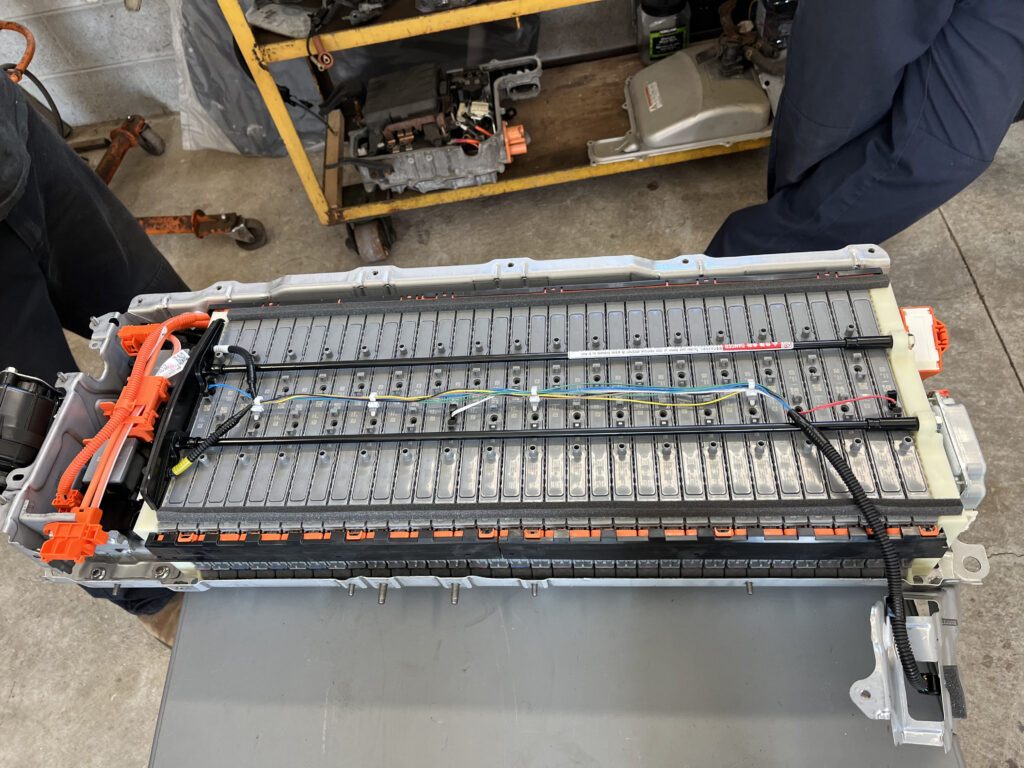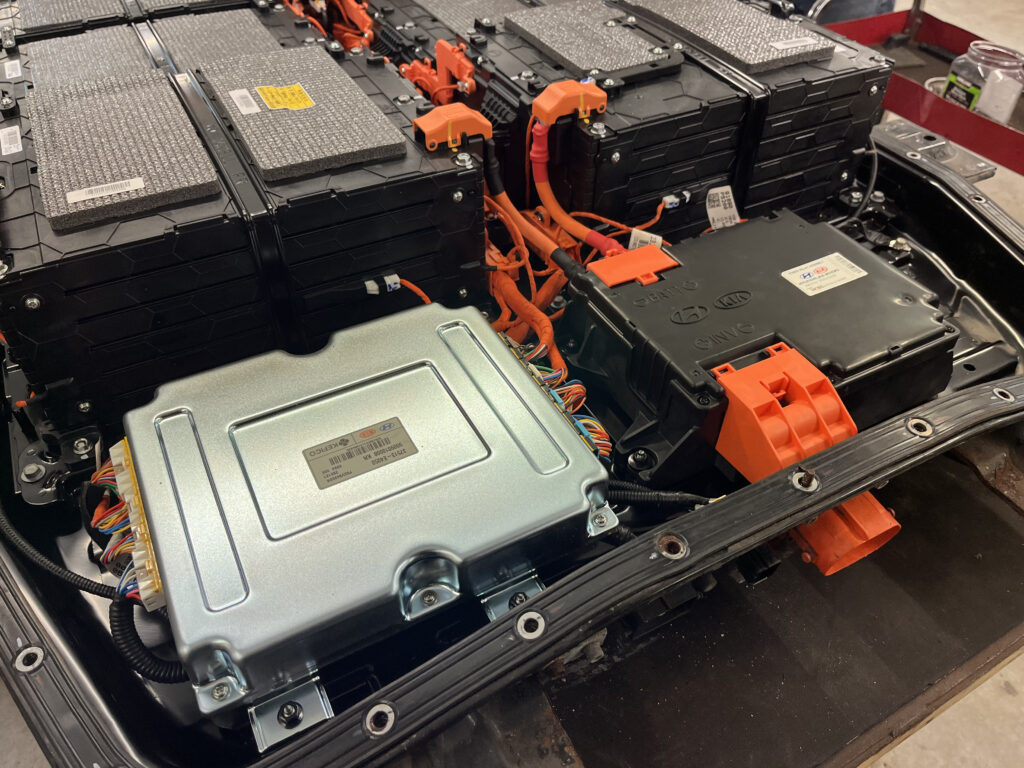EV World: Emerging opportunity
Share
Share

As electric vehicles become a more prominent feature of Canada’s automotive landscape, an opportunity is emerging for automotive repair garages across the country to engage in the repair and replacement of high-voltage EV batteries.
With more than 250,000 electric vehicles on Canadian roads as of 2024, according to Transport Canada — and these vehicles now being on the road well beyond warranty periods — their battery systems become one of the most critical and costly components to monitor, maintain, or replace. The lack of widespread battery repair expertise, limited manufacturer service networks and increasing demand for affordable used EVs create a significant opportunity for independent repair shops.
Let’s dive further into the challenges and economic opportunities for Canadian garages to become leaders in the maintenance and repair of high-voltage EV battery systems.
Canada has committed to ambitious climate goals, including a mandate that all new passenger vehicles and light trucks sold by 2035 must be zero-emission. To support this, the federal government has provided rebates (such as the iZEV program) and, along with the industry, has invested in charging infrastructure and educational programs such as those provided by Plug ‘N Drive to further EV adoption.
Although we have seen a recent slowdown due to the elimination of incentives, added tariffs and supply challenges over the past several years, ownership has surged in recent years, particularly in provinces like Quebec and British Columbia. Data from S&P Global Mobility show that plug-in vehicles (battery electric and plug-in hybrid combined) accounted for almost 19 per cent of all new light-duty vehicle registrations in Q4 2024 and 9.7 per cent in Q1 2025. Despite the drop in volume, new EVs and PHEVs are still being added to our car parc.
As first-generation EVs age and reach the end of their warranties, the aftermarket support structure is becoming critically important. While legacy automakers like Toyota, GM, Ford and Hyundai offer battery replacement services, these are often centralized and limited to dealerships, creating delays and high costs. Many EVs are now past their warranty periods and will require battery diagnostics, repairs, or outright replacement. This presents a pressing need and a business opportunity for skilled independent garages.
The issue with EV battery replacement is that they’re expensive. A full replacement of a high-voltage lithium-ion battery can cost anywhere between $12,000-$25,000, and even more for high-end or independent manufacturers, depending on the vehicle model.
For example, a Chevrolet Bolt’s battery replacement can exceed $16,000, while a Tesla Model S will surpass $20,000. My Kia EV Soul battery cost more than $20,000. These high costs contribute to depreciation and hesitation in the used EV market. Repairing rather than replacing batteries can offer consumers a more affordable path to keeping their vehicles on the road, especially when many manufacturers designed their batteries to be serviced and or repaired.
My Kia battery had its internal battery modules replaced as opposed to a new battery pack and my vehicle’s performance is as it was when new, with full range.
There are opportunities for Canadian shops that invest in battery diagnostic and repair capabilities to offer repair services such as:
■ Module-level diagnostics and replacement: Individual cells or modules may degrade at different rates. Replacing faulty modules is far cheaper than full pack replacements.
■ Thermal management system repairs: EVs use complex liquid or air-based systems to keep battery temperatures optimal. Failures here can be repaired independently of the battery core in some batteries.
■ Battery management system recalibration: Software and sensor issues can mimic battery degradation and may be resolved through reprogramming.
■ Battery pack resealing and maintenance: Especially in salt-heavy environments like Ontario and Quebec, corrosion and water ingress can damage battery housings.

The cost advantage for consumers choosing to repair instead of replace creates a market incentive. For instance, a garage that charges $4,000 for a module replacement may help the customer avoid a $20,000 full-pack replacement, while still generating a strong profit margin.
One of the biggest drivers of demand is the growing population of aging EVs. Many early adopters of Nissan Leafs, Chevrolet Volts and older Teslas are now facing battery degradation. In addition, there are also some vehicles, such as older Prius models, that can be upgraded to lithium for increased performance and range.
Natural Resources Canada reports that lithium-ion battery life varies between 8 to 15 years, depending on usage, climate and charging behaviour. In colder regions of Canada, this may be even further pronounced when degradation is coupled with colder temperatures and limited infrastructure.
Meanwhile, the centralized service models of OEMs and the shortage of trained dealership technicians create a service bottleneck. Wait times of several months for battery replacement are not uncommon. In Ontario and Alberta, for example, EV owners have reported waiting up to six months for parts and qualified technicians.
Independent shops that can offer faster service with lower costs stand to fill this vacuum. For rural and northern communities, especially where dealership access is limited, local garages could become essential service providers for EV owners.
I have often promoted safe practices and hands-on training when servicing EVs because, as we all — I hope — know now, working on high-voltage batteries is not difficult if you are prepared. But knowledge and safety are paramount.
These systems operate at voltages exceeding 400 volts, posing electrocution risks if mishandled. The lithium-ion chemistry involved can lead to other risks, such as fires and thermal runaway, if battery cells are punctured or improperly assembled. Training and equipment costs can be significant. However, with battery repairs generating thousands of dollars in revenue per job, many garages can recover these costs within their first year of operation.
According to the Canadian Apprenticeship Forum, there are fewer than 10,000 EV-trained technicians across Canada — and fewer than 1,000 with high-voltage battery training or certification. Ontario alone will require more than 20,000 EV-trained technicians by 2030, especially in growing EV markets like Toronto, Ottawa and Windsor.
Colleges and trade schools are beginning to respond. For instance, Centennial College in Toronto and BCIT in British Columbia now offer EV repair modules. However, most graduates still lack hands-on battery repair experience.
Some organizations have developed strong internal training programs, such as NAPA through its NexDrive program — where certified repair shops are capable of doing EV repair including battery repair.
Independent training firms such as the AutoProf and Environmental Motorworks, with which I am affiliated, also provide in-class or in-house, hands-on diagnostic and repair training, including battery repair and replacement. This represents a further opportunity for shops to partner with training institutions and develop in-house expertise.

A robust battery repair industry is crucial for strengthening Canada’s used EV market.
One of the top reasons Canadians hesitate to buy used EVs is battery longevity and replacement cost uncertainty. A 2023 survey by KPMG Canada found that 61 per cent of Canadians were concerned about the high cost of battery replacement in used EVs, which reduced their willingness to purchase second-hand.
Independent garages that can assess, diagnose and repair batteries affordably will help reassure used EV buyers. Services such as pre-sale battery health inspections, range reconditioning or warranty-backed battery repairs could become key selling points in the secondary market.
The opportunity for battery repair does vary by region. In Quebec, where over 54 per cent of new EVs in Canada were registered in 2024, the density of EVs makes battery repair a high-demand service. Quebec’s cold winters and salted roads also accelerate battery housing degradation —leading to more corrosion-related service needs.
In British Columbia, high EV adoption in urban areas and provincial incentives support a healthy EV ecosystem, but battery replacement still faces bottlenecks. Independent repair could flourish in cities like Victoria, Kelowna and Nanaimo, where dealership access is limited.
In Ontario, the market is fragmented, with large urban centres like Toronto showing strong demand but vast rural areas being underserved. Shops in these regions may be able to tap into EV service deserts — especially if mobile repair services are developed.
In step with this, there is growing interest in battery reconditioning and reuse. Companies like Relectrify and Voltaiq are developing second-life applications for battery packs — either for stationary energy storage or low-power vehicle use. There is a market in salvaging healthy modules from degraded packs and reselling them to energy storage providers or manufacturers.
By enabling repair over replacement, independent garages also contribute to the circular economy and meeting Canada’s environmental goals. A typical EV battery contains significant quantities of lithium, cobalt, and nickel. Repairing battery modules instead of replacing full packs reduces the demand for new raw materials.
Canada is home to emerging recycling players such as Li-Cycle and RecycLiCo, but the industry benefits when batteries can be kept in service longer. Independent garages can become an essential bridge between EV owners and recyclers, identifying which batteries can be repaired and which must be retired.
The repair and replacement of high-voltage EV batteries is not only a necessity in Canada’s transition to zero-emission transportation, it is a lucrative and essential opportunity for the automotive service industry.
With the right investment in training, equipment and safety protocols, independent shops across Canada can fill a growing gap in the EV ecosystem. In doing so, they can generate new revenue, support sustainable transportation, and contribute to an important used EV market.
David Mayers is chief executive officer at Environmental Motorworks, an innovative services company centred on providing hands-on EV and hybrid training to technicians and fleet operators in the automotive and heavy equipment sectors.
This article originally appeared in the Summer 2025 issue of EV World
Leave a Reply